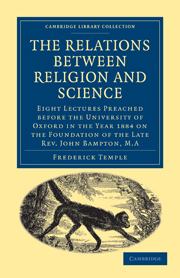 The Relations between Religion and Science
The Relations between Religion and Science Book contents
- Frontmatter
- Contents
- LECTURE I THE ORIGIN AND NATURE OF SCIENTIFIC BELIEF
- LECTURE II THE ORIGIN AND NATURE OF RELIGIOUS BELIEF
- LECTURE III APPARENT CONFLICT BETWEEN SCIENCE AND RELIGION ON FREE-WILL
- LECTURE IV APPARENT CONFLICT BETWEEN RELIGION AND THE DOCTRINE OF EVOLUTION
- LECTURE V REVELATION THE MEANS OF DEVELOPING AND COMPLETING SPIRITUAL KNOWLEDGE
- LECTURE VI APPARENT COLLISION BETWEEN RELIGION AND THE DOCTRINE OF EVOLUTION
- LECTURE VII APPARENT COLLISION OF SCIENCE WITH THE CLAIM TO SUPERNATURAL POWER
- LECTURE VIII THE CONCLUSION OF THE ARGUMENT
LECTURE III - APPARENT CONFLICT BETWEEN SCIENCE AND RELIGION ON FREE-WILL
Published online by Cambridge University Press: 29 August 2010
- Frontmatter
- Contents
- LECTURE I THE ORIGIN AND NATURE OF SCIENTIFIC BELIEF
- LECTURE II THE ORIGIN AND NATURE OF RELIGIOUS BELIEF
- LECTURE III APPARENT CONFLICT BETWEEN SCIENCE AND RELIGION ON FREE-WILL
- LECTURE IV APPARENT CONFLICT BETWEEN RELIGION AND THE DOCTRINE OF EVOLUTION
- LECTURE V REVELATION THE MEANS OF DEVELOPING AND COMPLETING SPIRITUAL KNOWLEDGE
- LECTURE VI APPARENT COLLISION BETWEEN RELIGION AND THE DOCTRINE OF EVOLUTION
- LECTURE VII APPARENT COLLISION OF SCIENCE WITH THE CLAIM TO SUPERNATURAL POWER
- LECTURE VIII THE CONCLUSION OF THE ARGUMENT
Summary
‘So God created man in His own image, in the image of God created He him.’
Genesis i. 27.RELIGION and Science both begin with the human will. The will is to Science the first example of power, the origin of the conception of cause; the bodily effort made by the will lies at the root of the conception of force. It is by comparing other forces with that force that Science begins its march. And the will is to religion the recipient of the Divine command. To the will the inner voice addresses itself, bidding it act and believe. It is because we have a will that we are responsible. In a world in which there were no creatures endowed with a will, there could be no right-doing or wrong-doing; no approval by conscience and no disapproval; no duty and no faith.
Here is the first possibility of collision between Science and Religion. Science postulates uniformity; Religion postulates liberty. Science cannot ever hope to reduce all phenomena to unity if a whole class of phenomena, all those that belong to the action of human will, are to be excluded from the postulate of invariable sequence. The action of the will is in this case for ever left outside. The evidence for the absolute uniformity of nature seems to be shaken, when it is found that there is so important a part of phenomena to which this law of uniformity cannot be applied.
- Type
- Chapter
- Information
- The Relations between Religion and ScienceEight Lectures Preached before the University of Oxford in the Year 1884 on the Foundation of the Late Rev. John Bampton, M.A., pp. 67 - 96Publisher: Cambridge University PressPrint publication year: 2009First published in: 1884


